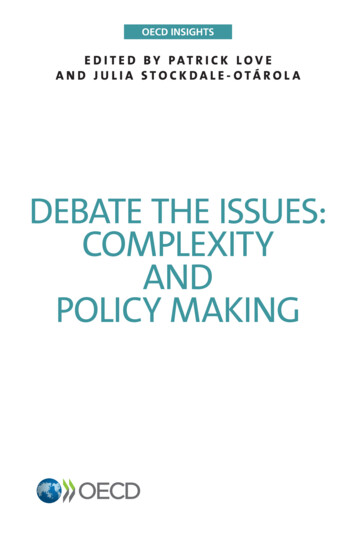
Transcription
OECD InsightsE d i t e d by Pat r i c k L ov ea n d J u l i a S t o c k d a le - O t á r o l aDebate the Issues:ComplexityandPolicy making
OECD InsightsDebate the Issues:Complexity andpolicy making
This work is published under the responsibility of the Secretary-General ofthe OECD. The opinions expressed and arguments employed herein do notnecessarily reflect the official views of OECD member countries.This document and any map included herein are without prejudice to thestatus of or sovereignty over any territory, to the delimitation of internationalfrontiers and boundaries and to the name of any territory, city or area.Please cite this publication as:OECD (2017), Debate the Issues: Complexity and policy making, OECD Insights, OECD Publishing,Paris, http://dx.doi.org/10.1787/9789264271531-en.ISBN 978-92-64-27152-4 (print)ISBN 978-92-64-27153-1 (PDF)ISBN 978-92-64-27158-6 (epub)Series: OECD InsightsISSN 1993-6745 (print)ISSN 1993-6753 (online)Revised version, June 2017Details of revisions available at:h t t p : / / w w w. o e c d . o rg / a b o u t / p u b l i s h i n g / C o r r i g e n d u m D e b a t e t h e I s s u e s Complexity and policy making.pdfCorrigenda to OECD publications may be found on line at:www.oecd.org/about/publishing/corrigenda.htm. OECD 2017You can copy, download or print OECD content for your own use, and you can include excerpts from OECDpublications, databases and multimedia products in your own documents, presentations, blogs, websites andteaching materials, provided that suitable acknowledgement of OECD as source and copyright owner is given.All requests for public or commercial use and translation rights should be submitted to rights@oecd.org.Requests for permission to photocopy portions of this material for public or commercial use shall beaddressed directly to the Copyright Clearance Center (CCC) at info@copyright.com or the Centre françaisd’exploitation du droit de copie (CFC) at contact@cfcopies.com.
ForewordbyGabriela Ramos, OECD Chief of Staff and Sherpa to the G20The OECD has prided itself on its essential role in reconcilingthe economy with nature and society. At present, the globalcommunity is failing to fully grasp and advance this fundamentalagenda. To do so we need to improve our analytical frameworks,policy tools and models.The Financial Crisis, almost ten years ago, was a wake-upcall on the inadequacies of our policy approaches. But a numberof other important trends were also moving in the wrongdirection. Perhaps the most serious indictment of our economicapproaches has been the emergence and failure of theinternational community to take serious action on climatechange. A related problem is the unsustainable consumption ofthe Earth’s resources, currently running at 1.6 planets, i.e. ittakes the Earth 1 year and 7 months to regenerate what we usein a year.Inequality in many OECD countries has also been risingsteadily and has now reached critical levels, weakening socialcohesion and trust while undermining growth and well-being.The boundless pursuit of increased growth and consumption,the traditional treatment of environmental degradation andincome inequality as externalities or marginal market failuresand the contention that individuals left to their own devices willself-organise into a socially desirable state have been part of theproblem. Simply improving the way markets operate will notOECD Insights – DEBATE THE ISSUES: COMPLEXITY AND POLICY MAKING OECD 20173
FOREWORDsolve our pressing problems. Alan Kirman argues that thecurrent paradigm is neither validated by empirical evidence nordoes it have sound theoretical foundations.Economists and policy makers have failed to appreciate thecomplexity of human behaviour and the systems in which welive. A complexity approach allows us to look at systems ofsystems consisting of vast numbers of individual elements thatinteract in complicated ways, such as ecosystems, financialmarkets, and energy networks, or societal phenomena such asurbanisation and migration.It also challenges mainstream thinking on key issues. Forexample, according to the Kuznets’ curve, income inequalityshould first rise and then fall as countries’ income moves fromlow to high. The empirical evidence however does not seem tobear this out. In this volume, an approach based on economiccomplexity by César Hidalgo and others suggests that inequalitydepends not only on a country’s rate or stage of growth, but alsoon its type of growth and institutions.In economics, we still talk about flows, masses, equilibriumand so on (a gravity model of trade, for example). But these termsare rooted in classical physics, developed before relativity andquantum theory. The new sciences of complexity can provideinsights into how groups of people actually behave when they(re)act together to form economic and socio-political systems.These systems do not operate simply as a series of actions andreactions, but with feedback, non-linearity, tipping points,singularities, emergence, and all the other characteristics ofcomplex systems.Inspired by the OECD’s New Approaches to EconomicChallenges (NAEC) initiative, this book Debate the Issues:Complexity and policy making provides details of new frameworksthat better capture the complexities of modern economies andsocieties. Our economies are not closed general equilibriumsystems; they are complex and adaptive, embedded in specificsocieties with their own history, culture, and values, as well as innatural environments governed by biophysical laws.4OECD Insights – DEBATE THE ISSUES: COMPLEXITY AND POLICY MAKING OECD 2017
FOREWORDA number of prominent economists have joined this call fora new approach to policy making. Andy Haldane, ChiefEconomist of the Bank of England writes that NAEC and OECD’swillingness to consider a complexity approach “puts theOrganisation at the forefront of bringing economic analysis andpolicy-making into the 21st century”. While Eric Beinhocker fromthe Institute for New Economic Thinking expresses the hope that“the OECD will continue to play a leadership role, through NAECand its other initiatives, on new economic thinking, not just in anarrow technical sense, but in the broad sense of helping forge anew vision that puts people back at the centre of our economy”.Having led the NAEC and Inclusive Growth initiatives, I havebeen pushing the idea at the OECD, in member Countries andKey Partner countries, as well as the G20, that economic growthis a means to an end – not an end in itself. This Insights bookargues that our efforts to understand economic growth as ameans to improve well-being could benefit from an approachthat sees inclusive growth as the outcome of complexinteractions among economics, politics, psychology, culture,history, environment, and ambition.If we want growth to be inclusive, our way of thinking aboutit has to be inclusive too.OECD Insights – DEBATE THE ISSUES: COMPLEXITY AND POLICY MAKING OECD 20175
Table of contentsIntroduction: A complexity approach to economic challengesby William Hynes . . . . . . . . . . . . . . . . . . . . . . . . . . . . . . . . . . . . . .9Complexity and policy making . . . . . . . . . . . . . . . . . . . . . . . . . . .Stop pretending that an economy can be controlledby Angel Gurría . . . . . . . . . . . . . . . . . . . . . . . . . . . . . . . . . . . . . . . .14It’s not just the economy: Society is a complex system tooby Gabriela Ramos . . . . . . . . . . . . . . . . . . . . . . . . . . . . . . . . . . . . .17A new role for science in policy formation in the ageof complexity?by Vladimir Šucha . . . . . . . . . . . . . . . . . . . . . . . . . . . . . . . . . . . . . .21Ants, algorithms and complexity without managementby Deborah M. Gordon. . . . . . . . . . . . . . . . . . . . . . . . . . . . . . . . . . .25Navigating wicked problemsby Julia Stockdale-Otárola . . . . . . . . . . . . . . . . . . . . . . . . . . . . . . . .28Out of complexity, a third way?by Bill Below . . . . . . . . . . . . . . . . . . . . . . . . . . . . . . . . . . . . . . . . . .31Complexity and economics . . . . . . . . . . . . . . . . . . . . . . . . . . . . . .Complexity and economic policyby Alan Kirman . . . . . . . . . . . . . . . . . . . . . . . . . . . . . . . . . . . . . . . .133536A pragmatic holist: Herbert Simon, economicsand The Architecture of Complexityby Vela Velupillai . . . . . . . . . . . . . . . . . . . . . . . . . . . . . . . . . . . . . . .39From economic crisis to crisis in economicsby Andy Haldane . . . . . . . . . . . . . . . . . . . . . . . . . . . . . . . . . . . . . . .42Complexity theory and evolutionary economicsby Robert D. Atkinson . . . . . . . . . . . . . . . . . . . . . . . . . . . . . . . . . . .46Complexity, modesty and economic policyby Lex Hoogduin . . . . . . . . . . . . . . . . . . . . . . . . . . . . . . . . . . . . . . .49The rising complexity of the global economyby Sony Kapoor . . . . . . . . . . . . . . . . . . . . . . . . . . . . . . . . . . . . . . . .52Economic complexity, institutions and income inequalityby César Hidalgo and Dominik Hartmann . . . . . . . . . . . . . . . . . . .55Crowds, consensus and complexity in economic forecastingby Brian Dowd. . . . . . . . . . . . . . . . . . . . . . . . . . . . . . . . . . . . . . . . .58OECD Insights – DEBATE THE ISSUES: COMPLEXITY AND POLICY MAKING OECD 20177
TABLE OF CONTENTSComplexity and the financial system. . . . . . . . . . . . . . . . . . . . . .A complex global financial systemby Adrian Blundell-Wignall . . . . . . . . . . . . . . . . . . . . . . . . . . . . . . .62Complexity and better financial regulationby Harald Stieber. . . . . . . . . . . . . . . . . . . . . . . . . . . . . . . . . . . . . . .66Agent-based models to help economics do a better jobby Richard Bookstaber . . . . . . . . . . . . . . . . . . . . . . . . . . . . . . . . . . .69Applications of complexity theory . . . . . . . . . . . . . . . . . . . . . . . .Urbanisation and complex Systemsby Colin Harrison. . . . . . . . . . . . . . . . . . . . . . . . . . . . . . . . . . . . . . .74Big Data, complexity theory and urban developmentby Ricardo Herranz . . . . . . . . . . . . . . . . . . . . . . . . . . . . . . . . . . . . .77Innovation and complexityby Andrew Wyckoff . . . . . . . . . . . . . . . . . . . . . . . . . . . . . . . . . . . . .80Governing education in a complex worldby Tracey Burns . . . . . . . . . . . . . . . . . . . . . . . . . . . . . . . . . . . . . . . .84Development as the outcome of a complex adaptive systemby Frans Lammersen and Jorge Moreira da Silva . . . . . . . . . . . . . .87Towards a new narrative. . . . . . . . . . . . . . . . . . . . . . . . . . . . . . . . .Sing for our time too, or what Homer can teach us aboutcomplexityby Patrick Love. . . . . . . . . . . . . . . . . . . . . . . . . . . . . . . . . . . . . . . . .861739192A new narrative for a complex ageby Eric Beinhocker . . . . . . . . . . . . . . . . . . . . . . . . . . . . . . . . . . . . . .95Telling the whole truth in a post-truth environmentby Gabriela Ramos . . . . . . . . . . . . . . . . . . . . . . . . . . . . . . . . . . . . .99OECD Insights – DEBATE THE ISSUES: COMPLEXITY AND POLICY MAKING OECD 2017
Introduction:A complexity approachto economic challengesbyWilliam Hynes, OECD New Approachesto Economic Challenges (NAEC) initiativeThe OECD launched its New Approaches to EconomicChallenges (NAEC) initiative in 2012 to reflect on the lessons foreconomic analysis and policy making from the financial crisis andGreat Recession. European Central Bank Governor Jean-ClaudeTrichet said that: “As a policy-maker during the crisis, I found theavailable models of limited help. In fact, I would go further: in theface of the crisis, we felt abandoned by conventional tools”. But evenbefore the crisis Greg Mankiw from Harvard University lamentedthat “macroeconomic research of the past three decades has had onlyminor impact on the practical analysis of monetary or fiscal policy”.NAEC examined the shortcomings of analytical models, and itpromotes new policy tools and data. It questions traditional ideasand methods and challenges group-think and silo approaches byinviting comment and criticism from outside the Organisation, andby soliciting input from social sciences such as sociology,psychology, and history to enrich the policy discussions.While the financial crisis struck at the core of traditionaleconomic theory and models, it became apparent in 2016 that thefailure of economic thinking and acting was far deeper and moredestabilising than we thought, so part of NAEC’s mandate is todevelop an agenda for inclusive and sustainable growth.OECD Insights – DEBATE THE ISSUES: COMPLEXITY AND POLICY MAKING OECD 20179
INTRODUCTION: A COMPLEXITY APPROACH TO ECONOMIC CHALLENGESThis is all the more urgent given the backlash againstglobalisation, increased inequalities of income and opportunities,and the negative impact of growth on the environment. We need todevelop what Eric Beinhocker calls a “new narrative of growth”, onethat puts people at the centre of economic policy. Therefore NAEC ishelping to focus on redistribution, a concept neglected in economicanalysis for many years, and helping to ensure that policy decisionsimprove the lives of those at the bottom of the income distribution.It is also helping to consider the well-being of people as a multidimensional concept, which implies reconsidering importantelements of the economic narrative, such as justice and socialcohesion. NAEC does so by thinking out of the box, emphasising theneed to empower people, regions and firms to fulfil their fullpotential. This is at the core of the Productivity-Inclusiveness Nexusthat considers how to expand the productive assets of an economyby investing in the skills of its people; and that provides a levelplaying field for firms to compete, including in lagging regions.However, the challenges are too complex and interconnectedfor conventional models and analyses. As Andy Haldane argues, theglobal economy is increasingly characterised by discontinuities,tipping points, multiple equilibria, radical uncertainties and theother characteristics of complex systems. This is why a key theme ofNAEC has been the complexity and interconnectedness of theeconomy, exemplified by the Productivity-Inclusiveness Nexus.The contributors to this series argue that complexity andsystems thinking can improve understanding of issues such asfinancial crises, sustainability of growth, competitiveness,innovation, and urban planning. Recognising the complexity of theeconomy implies that greater attention should be paid tointeractions, unintended consequences, stability, resilience, policybuffers and safeguards.Working with the European Commission and the Institute forNew Economic Thinking (INET) Oxford, the NAEC initiativedemonstrated in a number of workshops that complexity economicsis a promising approach for delivering new insights into major publicpolicy challenges and an exciting research agenda going forward.10OECD Insights – DEBATE THE ISSUES: COMPLEXITY AND POLICY MAKING OECD 2017
INTRODUCTION: A COMPLEXITY APPROACH TO ECONOMIC CHALLENGESThe workshops offered a timely opportunity for policy makers,academics and researchers to discuss the policy applicationsemerging from the study of complexity. The NAEC Roundtable inDecember 2016 discussed whether economics was close to a tippingpoint – a transition to a new behavioural complexity paradigm.There is wide agreement among economists on the limitations andthe shortcomings of the rational expectations paradigm and muchdiscussion on how to move forward.The first phase of NAEC’s complexity work has made the casefor further and deeper examination of complexity. Going forward, itwill be important to demonstrate the value of complexity, systemsthinking and agent-based models in a number of areas includingfinancial networks, urban systems and the other issues highlightedin this series. The challenge is to demonstrate the value of theapproach.Complexity offers an opportunity for addressing long-heldconcerns about economic assumptions, theories and models. For theOECD, it also holds out the potential for creating better policies forbetter lives.Useful linksThe original article on OECD Insights, including links and supplementarymaterial, can be found here: http://wp.me/p2v6oD-2PlThe full series can be found here: http://oecdinsights.org/?s NAEC complexityOECD Insights – DEBATE THE ISSUES: COMPLEXITY AND POLICY MAKING OECD 201711
Complexityand policy making
COMPLEXITY AND POLICY MAKINGStop pretending that an economycan be controlledby Angel Gurría, OECD Secretary-GeneralThe crisis exposed some serious flaws in our economicthinking. It has highlighted the need to look at economic policy withmore critical, fresh approaches. It has also revealed the limitationsof existing tools for structural analysis in factoring in key linkages,feedbacks and trade-offs – for example between growth, inequalityand the environment.We should seize the opportunity to develop a new understandingof the economy as a highly complex system that, like any complexsystem, is constantly reconfiguring itself in response to multipleinputs and influences, often with unforeseen or undesirableconsequences. This has many implications. It suggests policy makersshould be constantly vigilant and more humble about their policyprescriptions, act more like navigators than mechanics, and be opento systemic risks, spillovers, strengths, weaknesses, and humansensitivities. This demands a change in our mind-sets, and in ourtextbooks. As John Kenneth Galbraith once said, “the conventionalview serves to protect us from the painful job of thinking.”This is why at the OECD we launched an initiative called NewApproaches to Economic Challenges (NAEC). With this initiative wewant to understand better how the economy works, in all itscomplexity, and design policies that reflect this understanding. Ouraim is to consider and address the unintended consequences ofpolicies, while developing new approaches that foster moresustainable and inclusive growth.Complexity is a common feature of a growing number of policyissues in an increasingly globalised world employing sophisticatedtechnologies and running against resource constraints.The report of the OECD Global Science Forum (2009) onApplications of Complexity Science for Public Policy reminds us ofthe distinction between complicated and complex systems.Traditional science (and technology) excels at the complicated, but isstill at an early stage in its understanding of complex phenomenalike the climate.14OECD Insights – DEBATE THE ISSUES: COMPLEXITY AND POLICY MAKING OECD 2017
COMPLEXITY AND POLICY MAKINGFor example, the complicated car can be well understood usingnormal engineering analyses. An ensemble of cars travelling down ahighway, by contrast, is a complex system. Drivers interact andmutually adjust their behaviours based on diverse factors such asperceptions, expectations, habits, even emotions. To understandtraffic, and to build better highways, set speed limits, installautomatic radar systems, etc., it is helpful to have tools that canaccommodate non-linear and collective patterns of behaviour, andvarieties of driver types or rules that might be imposed. The tools ofcomplexity science are needed in this case. And we need better rulesof the road in a number of areas.This is not an academic debate. The importance of complexity isnot limited to the realm of academia. It has some powerful advocates inthe world of policy. Andy Haldane at the Bank of England has thoughtof the global financial system as a complex system and focused onapplying the lessons from other network disciplines – such as ecology,epidemiology, and engineering – to the financial sphere. More generally,it is clear that the language of complexity theory – tipping points,feedback, discontinuities, fat tails – has entered the financial andregulatory lexicon. Haldane has shown the value of adopting acomplexity lens, providing insights on structural vulnerabilities thatbuilt up in the financial system. This has led to policy suggestions forimproving the robustness of the financial system.Closer to home, Bill White, Chairman of our Economic andDevelopment Review Committee (EDRC) has been an ardentadvocate of thinking about the economy as a complex system. Hehas spoken in numerous OECD meetings – in part as an explanationand in part as a warning – that systems build up as a result ofcumulative processes, can have highly unpredictable dynamics andcan demonstrate significant non-linearity. As a result Bill has urgedpolicy makers to accept more uncertainty and be more prudent. Healso urged economists to learn some exceedingly simple butimportant lessons from those that have studied or work withcomplex systems such as biologists, botanists, anthropologists,traffic controllers, and military strategists.Perhaps the most important insight of complexity is that policymakers should stop pretending that an economy can be controlled.Systems are prone to surprising, large-scale, seemingly uncontrollable,OECD Insights – DEBATE THE ISSUES: COMPLEXITY AND POLICY MAKING OECD 201715
COMPLEXITY AND POLICY MAKINGbehaviours. Rather, a greater emphasis should be placed on buildingresilience, strengthening policy buffers and promoting adaptability byfostering a culture of policy experimentation.At the OECD, we are starting to embrace complexity. For severalyears we have been mapping the trade “genome” with our Trade inVa l u e A d d e d ( Ti VA ) d a t ab a s e t o e x p l a i n t h e c o m m e rc i a linterconnections between countries.We have examined the possibilities for coupling economic andother systems models, for example environmental (climate) andsocietal (inequalities). Our work on the Costs of Inaction andResource Constraints: Implications for Long-term Growth (CIRCLE) isa key example of linking bio-physical models and economic modelsto gauge the impact of environmental degradation and climatechange on the economy.We are also looking at governing complex systems in areas asdiverse as education and international trade policy. And we are lookingat the potential for tapping Big Data – an indispensable element ofcomplexity modelling approaches. But there remains much to do tofully enrich our work with the perspectives of complexity.The OECD is delighted to work with strong partners – theInstitute for New Economic Thinking (INET) Oxford, and the EuropeanCommission to help policy makers advance the use of complexsystems thinking to address some of the most difficult challenges.An important question remains. How can the insights andmethods of complexity science be applied to assist policy makers asthey tackle difficult problems in areas such as environmentalprotection, financial regulation, sustainability or urban development?The Workshop on Complexity and Policy in September 2016 atthe OECD helped find the answer – stimulate new thinking, newpolicy approaches and ultimately better policies for better lives.Useful linksThe original article on OECD Insights, including links and supplementarymaterial, can be found here: http://wp.me/p2v6oD-2DzThe full series can be found here: http://oecdinsights.org/?s NAEC complexity16OECD Insights – DEBATE THE ISSUES: COMPLEXITY AND POLICY MAKING OECD 2017
COMPLEXITY AND POLICY MAKINGIt’s not just the economy: Society is a complexsystem tooby Gabriela Ramos, OECD Chief of Staff and Sherpa to the G20Income and wealth inequality is not a new phenomenon. Onthe contrary, it seems that it is a permanent feature in humanhistory, and over the years, its causes and consequences havebecome more numerous and more interconnected. The same is truefor many social phenomena, and even though the world looks morecomplicated today, it is not. What is different is the increasednumber of domains where public policy is expected to play a role.Regarding inequalities of income and wealth, governments have tomake decisions on several interlinked areas such as taxes, educationor health.Unfortunately, the tools at the disposal of policy makers havenot always been updated fast enough to cope with these challengesand with their interlinkages. Moreover, policies are often designedwithin the narrow confines of one issue, without taking into accounttheir consequences elsewhere.Economists have tried to simplify and abstract from reality withlimiting assumptions like the representative agent and generalequilibrium. They have also g iven primacy to the goal ofeffectiveness, in detriment to other important considerations suchas fairness. Yet, the use of aggregate data obscures the distributionalconsequences of policies: an economy as a whole may be doing well,but – as we have seen in recent years – there are severeconsequences for social cohesion, and ultimately growth itself, iflarge groups are excluded from the benefits of economic prosperity.In defining growth policies that aimed only at increasing GDP percapita, inadequate attention was paid to institutions, humanbehaviour, and culture. These approaches failed to adequatelyaccount for the realities of markets, consumer decisions, and theinterconnectedness of economic, communications and societalnetworks.OECD Insights – DEBATE THE ISSUES: COMPLEXITY AND POLICY MAKING OECD 201717
COMPLEXITY AND POLICY MAKINGIn stark contrast to the assumptions of neo-classicaleconomics, socio-economic systems are not stable, but in constantflux. Complexity science generates new insights and furnishes uswith the analytical tools and instruments to help us, as individualsand societies, to navigate this new understanding of the economy. Itaddresses some of the limitations which constrain conventionaleconomics and ultimately it is helping us to do a better job inadvising governments and public institutions.For example, taking a complexity-based approach we can beginto recognise that the causes and consequences of inequalities andmajor economic and societal problems are intertwined. Besidescontributing substantially to the increase of wealth inequality, thefinancialisation of the economy also led to increased systemic riskswhere a problem in the subprime markets led to a major economiccrisis that has set additional hurdles in the way of the mostvulnerable groups all over the world.Just like the financial system and its major risks, our socialsystems are complex and vulnerable. Considering the increasedfragmentation and divisions in our societies (and adding thechallenge of integration of migrants and marginalised groups) moreattention should be paid to social stability. In this vein, policies toaddress societal problems, should not only rely on traditionaleconomic tools and measures, but broaden them to bring insights ofuseful disciplines.This more realistic approach to how people and the economyactually work is needed – an integrated inclusive growth agendawhich also considers unintended consequences, trade-offs andcomplementarities between policy objectives.Indeed, I believe that economists – and the policy makers theyadvise – can do better by listening to and learning from others. It’snot easy for an organisation that has “Economic” in it is name, butwe need to break the monopoly of economics over policy – looking toother disciplines such as physics, biology, psychology, sociology,philosophy and history. Societies and economies are not staticfeatures that can be predicted, but evolutionary systems withbreakpoints and changes that need to be better characterised.18OECD Insights – DEBATE THE ISSUES: COMPLEXITY AND POLICY MAKING OECD 2017
COMPLEXITY AND POLICY MAKINGAt the OECD, we recognise the potential of new economicthinking, drawing on complexity theory, and evolutionary andbehavioural economics. Technological and analytical innovationsare driving a revolution in the physical sciences, biological sciences,and social sciences, breaking down the barriers between disciplinesand stimulating new, integrated approaches to pressing andcomplex challenges. Advances in computing power are opening upnew possibilities for integrating systems models, agent-basedmodelling and network analysis. It is only by properly utilising thesenew approaches that we can strive to create social and economicmodels that provide a more accurate representation of the worldaround us. These tools also allow us to get away from averagerepresentations, or to look at stocks and not only at flows in theeconomy (income vs wealth inequality).And indeed, economics is starting to incorporate insights fromother disciplines. For example, expectations may be admirablyrational in traditional models, but by combining psychology andeconomics we are designing policies based on how real peopleactually behave, not on limited assumptions about how somefictional average person should behave. Taking a problem-basedapproach, we can design policies to influence people and nudgethem in the right direction in areas such as consumer policy,regulation, and environmental protection.The OECD is part of this revolution and we are alreadytransforming our policy thinking and acting. With the NewApproaches to Economic Challenges (NAEC) initiative, we are takinga hard look at our analytical methods, our data and policy advice.Many articles in this series have argued that the economy isa complex adaptive system. Society is a complex system too. It isformed by the interaction and mutual dependence of individuals,and is pursuant to their spontaneous, natural behaviour. Sincethe emergence of hunter-gather societies inequalities havethreatened to undermine and weaken the fabric of the socialsystem. If we are to overcome the pernicious effects of theseinequalities, we need to think about the interactions between oursocial and economic systems – which follow their own logics –OECD Insights – DEBATE THE ISSUES: COMPLEXITY AND POLICY MAKING OECD 201719
CO
Out of complexity, a third way? by Bill Below. 31 Complexity and economics . 35 Complexity and economic policy by Alan Kirman. 36 A pragmatic holist: Herbert Simon, economics and The Architecture of Complexity










